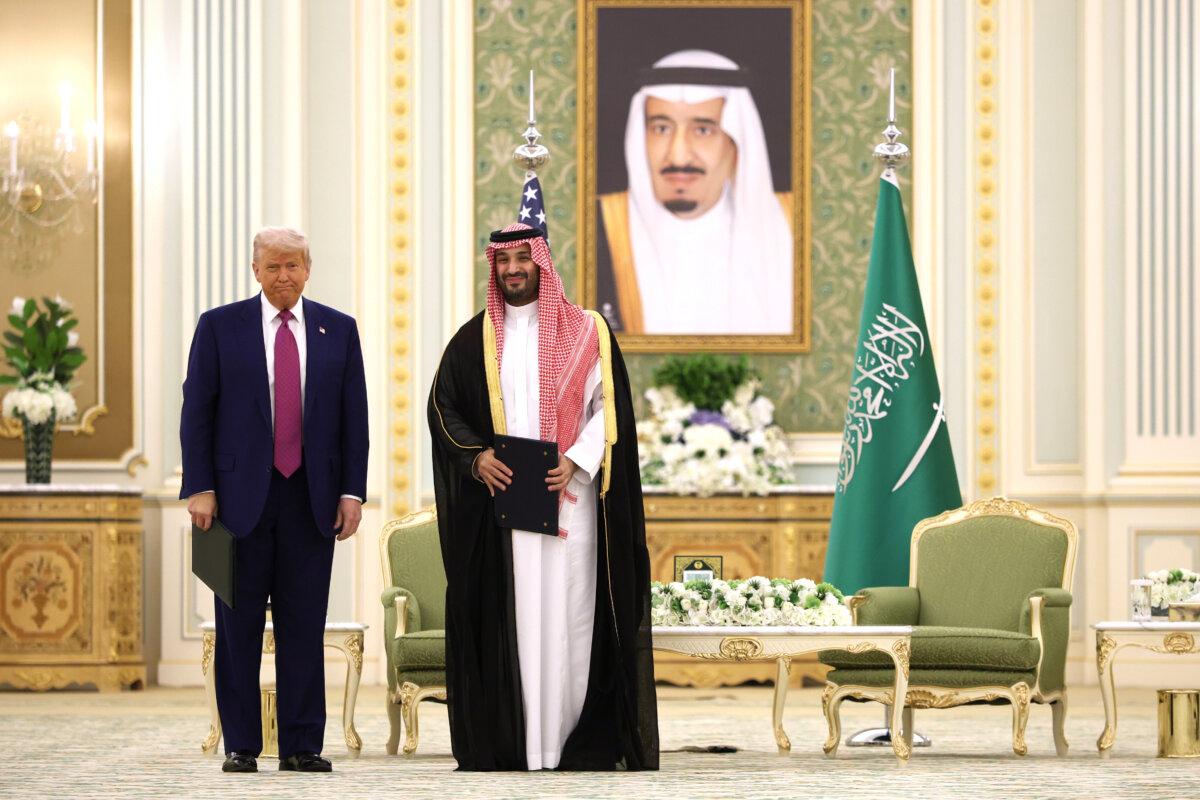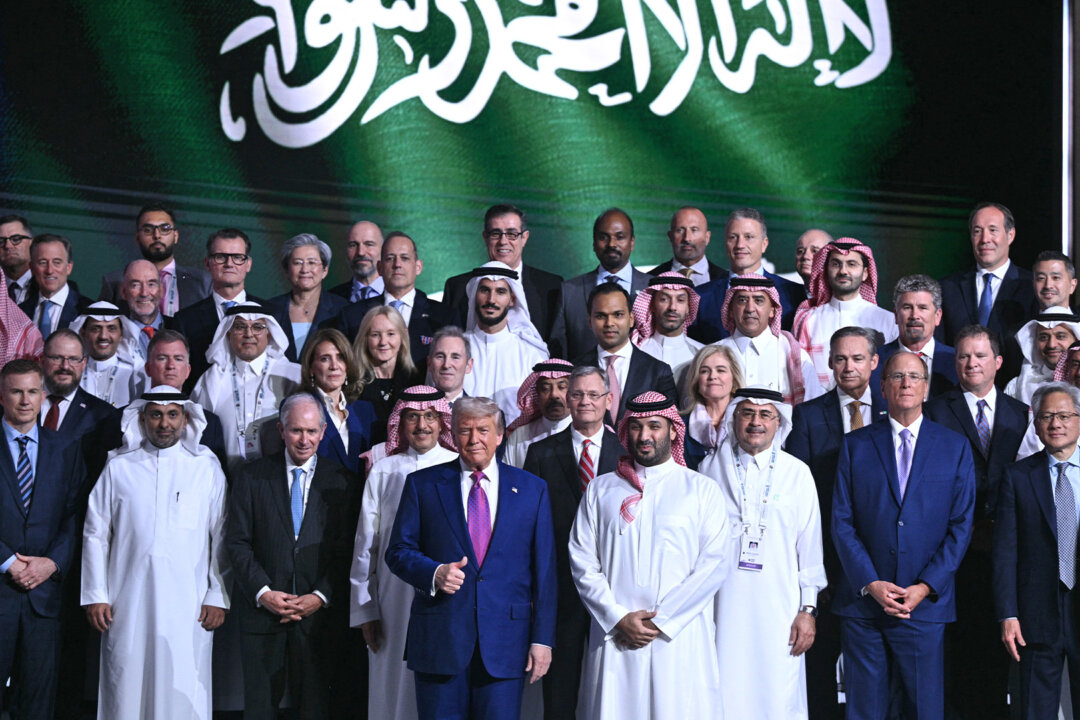Saudi Arabia committed to a $600 billion U.S. investment, including a nearly $142 billion arms deal.
RIYADH, Saudi Arabia—When President Donald Trump arrived in the Saudi capital on May 13, one of his first actions was to address the Gulf’s business elite, promoting the United States as a prime destination for investment amid a new era shaped by his “America First” agenda.
Trump made it clear that his three-day tour of the Middle East, with stops in Saudi Arabia, Qatar, and the United Arab Emirates, would be all about making deals.
Speaking at the Saudi–U.S. Investment Forum at the King Abdul Aziz International Conference Center, Trump commended the kingdom’s transformation since his last visit eight years ago.
He began his speech by saying, “I’ve come this afternoon to talk about the bright future of the Middle East, but first, let me begin by sharing the abundance of good news from a place called America.”
He talked about inheriting a border crisis and bringing illegal crossings down to historic lows within weeks, declining inflation, and nearly half a million new jobs being created since he took office. He praised trade deals with the UK and China as major wins, adding that investment in America is up 22 percent in the first quarter and that Congress is close to passing the largest tax and regulatory cuts in U.S. history, underscoring his message that now is the right moment to invest in the United States.
Prior to his prepared address, Trump took the stage in a way reminiscent of his 2024 election campaign, with “God Bless the USA” playing. He then spoke for more than an hour before wrapping up with “Y.M.C.A.,” the song he frequently used to close his campaign rallies.
“We are rocking,” Trump told the forum, bringing U.S. and Saudi business executives together.
“The United States is the hottest country, with the exception of your country, I have to say,” he joked.
As in his first term, Trump chose Saudi Arabia for his first state visit, signaling his strategic importance of ties with the oil-rich nation.
Seeking to draw multibillion-dollar investments into the United States, Trump turned to the Gulf states, home to some of the world’s largest sovereign wealth funds, as ideal partners to advance his economic agenda.
During the meetings in Riyadh, the kingdom has committed $600 billion in investments across various U.S. sectors, including AI data centers, aerospace, energy infrastructure, defense, and health care.
“We’ve launched the Golden Age,” Trump said.
“It’s the golden age. We see it, see it with all that money—trillions and trillions of dollars.
“We will be together. We will succeed together.”

Investment and Arms Agreements
Before his remarks at the investment forum, Trump and the crown prince signed a strategic economic partnership agreement, which includes several memoranda of understanding on energy, mineral resources, and cooperation in defense, justice, space, and infectious diseases.
As part of the agreement, Riyadh officials plan to allocate capital to specialized sectors, including a $5 billion Energy Investment Fund and a $5 billion New Era Aerospace and Defense Technology Fund.
In addition, the United States will export billions of dollars’ worth of gas turbines, energy solutions, and services. Saudi Arabia is also set to purchase approximately $142 billion in advanced warfighting equipment and services from more than a dozen U.S. defense companies. The White House described the deal as the “largest defense sales agreement in history.”
After taking office, Trump made it clear that his visits abroad would prioritize countries that commit to substantial investment in the United States.
The United Arab Emirates has earlier committed to a $1.4 trillion investment framework in the United States over the next decade, targeting AI and semiconductor infrastructure, the energy sector, and manufacturing. The UAE will be Trump’s third stop during his Middle East tour.
Trump touched down in Saudi Arabia with a strong delegation. Accompanying the president were several top officials and advisers, including Secretary of State Marco Rubio, Defense Secretary Pete Hegseth, Treasury Secretary Scott Bessent, Commerce Secretary Howard Lutnick, and Secretary of Energy Chris Wright, as well as senior aides Susie Wiles and Stephen Miller.
Crown Prince Mohammed bin Salman greeted Trump upon his arrival at the airport with a ceremonious welcome reminiscent of the warm reception he received during his first term.
During his bilateral meeting with the Saudi Crown Prince in Riyadh, Trump joked that his $600 billion investment commitment could be a trillion dollars.
“I really believe we like each other a lot,” Trump said.
In Riyadh, lavender carpets were rolled out for Trump at every stop. The color, chosen by Saudi Arabia as a national symbol, is inspired by the lavender flowers that blanket the kingdom’s deserts each spring.
After his arrival, Trump attended a high-level lunch at the Saudi Royal Court with bin Salman. Dozens of U.S. executives also participated in the lunch meeting, underscoring the economic focus of the visit and the potential business deals being negotiated.
Prominent guests included Tesla and SpaceX CEO Elon Musk, Blackstone CEO Stephen Schwarzman, BlackRock CEO Larry Fink, Boeing President and CEO Kelly Ortberg, and OpenAI CEO Sam Altman.
Companies also announced deals during the investment forum. Nvidia revealed it would sell more than 18,000 of its latest AI chips to Saudi tech firm Humain. Saudi Aramco unveiled a $3.4 billion investment plan to upgrade its Motiva refinery in Texas. Meanwhile, Musk announced that Saudi Arabia approved the use of Starlink for its maritime and aviation sectors.
Regional Security
During his address to the forum, Trump praised the transformation of Riyadh under the leadership of King Salman and the crown prince, calling it “truly extraordinary.”
Saudi Arabia and other Gulf nations have shifted from oil-dependent economies to diversified industries, including high tech, Trump said.
The president stated that this transition would lead to a future in which the region is “defined by commerce, not chaos,” and “exports technology, not terrorism.”
“After so many decades of conflict, finally it is within our grasp to reach the future that generations before us could only dream about—a land of peace, safety, harmony, opportunity, innovation, and achievement right here in the Middle East,” he said.
He took a shot at “Western interventionists” who give Arab nations “lectures on how to live and how to govern.”
“Riyadh and Abu Dhabi were not created by the so-called nation-builders, neocons, or liberal nonprofits like those who spent trillions and trillions of dollars failing to develop Kabul, Baghdad, so many other cities,” Trump said.
Trump touted the Abraham Accords signed during his first administration, expressing hope that Saudi Arabia would soon join the accord.
“It’s my fervent hope, wish, and even my dream that Saudi Arabia will soon be joining the Abraham Accords,” Trump said. “But you’ll do it in your own time.”
The Abraham Accords were various agreements signed in 2020 to improve relations between Israel and several Arab states, including Bahrain, Morocco, and the United Arab Emirates.
He acknowledged, however, that the Saudis are not prepared to bolster relations with Israel amid the ongoing conflict in Gaza.
Trump pivoted to Iran, striking a tough but cordial tone.
He described Iran as “the biggest and most destructive” force in the region, causing “unthinking suffering in Syria, Lebanon, Gaza, Iraq, Yemen, and beyond.” However, as Washington partakes in talks with Iran, Trump said he would offer the Islamic regime “a new path and a much better path toward a far better and more hopeful future.”
“The time is right now for them to choose,” the president said, alluding to the country’s nuclear ambitions. “Things are happening at a very fast pace, so they have to make their move right now.”
In a move that garnered sustained applause, Trump confirmed he would order the cessation of sanctions against Syria. He plans to greet Syrian President Ahmed al-Shara—who led the ousting of former leader Bashar al-Assad in December—on May 13.
The United States has imposed punishing restrictions on Syria in the wake of a civil war that began in 2011 there. Past presidents have attempted to pressure the government to halt violence against citizens and advocate for political reforms.
The new Syrian leader, Ahmed al-Sharaa, who has past links to terrorist organizations, has vowed to be a moderate leader and pursue diplomatic ties with Western countries. Since obtaining power, al-Sharaa has adopted several reforms that advance free speech, freedom of the press, and women’s political and economic rights.
He recently met with French President Emmanuel Macron over unwinding sanctions on Damascus.

